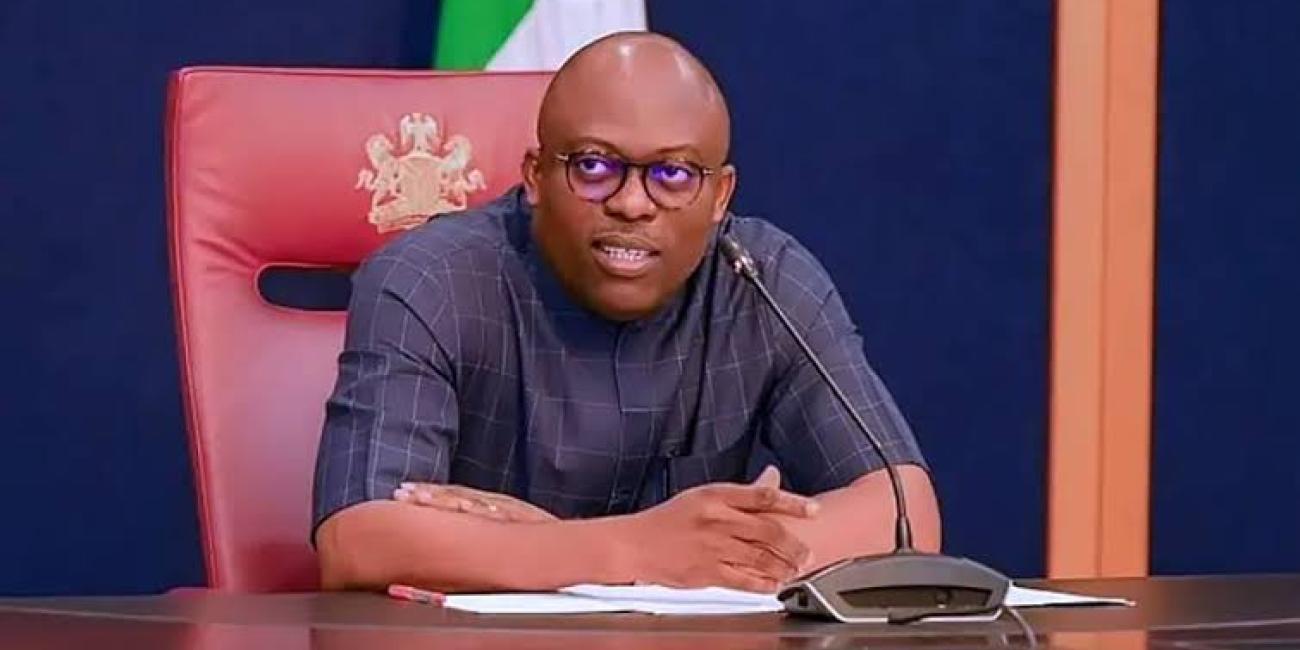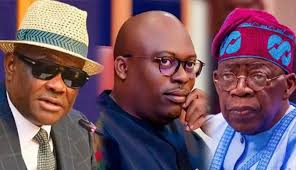PORT HARCOURT, Rivers State — In an explosive communique issued this morning by the Rivers State National Assembly Caucus, senior legislators have launched a searing attack on what they describe as a dangerous manipulation of the law by the executive arm of government.
The statement exposes an escalating conflict that not only challenges judicial authority but also threatens to unravel the constitutional fabric of Rivers State—a crisis centred around Governor Siminalayi Fubara’s controversial manoeuvres and the resolute defence of the Assembly’s legitimacy under the leadership of Rt. Hon. Martin Amaewhule, the duly elected Speaker.
A Stark Warning from the Federal Legislators
The communique, read before a gathering of senior media and political figures, serves as a direct rebuke to Governor Siminalayi Fubara.
The National Assembly caucus leaders assert that the governor has enlisted the services of influential legal figures, including Senior Advocates of Nigeria, with the aim of distorting judicial decisions and swaying public opinion in his favour.
According to the document, these actions amount to “delusion, prevarication, lies, and the deliberate distortion of facts and judgements of courts.”
At the heart of this dispute lies the accusation that Governor Fubara is manipulating legal outcomes to avoid complying with unfavourable court rulings.
The federal legislators contend that his campaign is designed to undermine judicial mandates—specifically the orders delivered by Hon. Justice J.K. Omotosho—by reinterpreting legal judgements in a manner that favours his political agenda.
This strategy, the legislators argue, is an affront to the rule of law and an attack on the democratic process.
Judicial Mandate and the Assembly’s Reliefs
Central to the communique is the affirmation of a series of judicial reliefs granted on 22 January 2024 by Hon. Justice J.K. Omotosho.
These reliefs confirm the legitimacy of Rt. Hon. Martin Amaewhule as Speaker of the Rivers State House of Assembly, alongside the 27 duly elected members.
The federal legislators emphasise that these orders have been endorsed by the Court of Appeal and the Supreme Court, rendering them immediately enforceable.
The legal pronouncement is unambiguous: upon the withdrawal of the governor’s appeal before the Supreme Court, all previous judgements—including those from the Court of Appeal—came into immediate and perpetual effect.
This judicial clarity leaves no room for any alternative interpretation or for the formation of a parallel Assembly.
The communique warns that any attempt to engage with or create another legislative body is not only a violation of the court’s decree but also an invitation to “political anarchy or social lawlessness.”
An Alleged Plot Against Constitutional Order
Beyond its legal admonitions, the statement paints a broader picture of subversive intent within the state’s executive leadership.
It alleges that, after failing to unseat the 27 lawmakers through the established judicial system, Governor Fubara has resorted to an audacious plot at a Federal High Court.
This plot aims to declare the seats of Rt. Hon. Martin Amaewhule and his colleagues vacant—a manoeuvre that, if successful, would undermine the democratic process and set a dangerous precedent for executive overreach.
The language employed is incendiary, denouncing “false content creators” and “political merchants” who allegedly propagate misleading narratives.
By drawing attention to these tactics, the federal legislators are not simply defending the state assembly’s institutional legitimacy but is signalling a broader resistance to any attempts to tamper with judicial pronouncements.
The legislators call on the executive to respect and execute the rulings of the Court of Appeal, thereby preventing a potential breakdown of law and order in Rivers State.
The Historical Context of Political Conflict
This latest confrontation is not an isolated incident. Rivers State, like many Nigerian states, has a long history of political strife characterised by tensions between the executive and legislative arms.
The current standoff echoes past episodes in which governors have sought to influence judicial outcomes and manipulate public opinion through strategic legal appointments.
Over the years, such episodes have not only eroded public trust in governmental institutions but have also precipitated a cycle of legal challenges and political unrest.
For political observers, the crisis represents a broader struggle for power—one where legal interpretations are weaponised to sideline opposition and consolidate authority.
The communique’s reference to the “misinterpretation of judgments” is a pointed critique, suggesting that Governor Fubara’s camp is actively undermining the independence of the judiciary.
Critics warn that these tactics, far from being benign reinterpretations of the law, constitute a flagrant abuse of power with the potential to destabilise Nigeria’s democratic institutions.
Legal Luminary Femi Falana Under Fire
The drama intensifies with the involvement of Mr Femi Falana SAN, a respected figure in Nigeria’s legal fraternity. The Assembly’s communique levies a serious charge against Falana, accusing him of “misinterpreting judgements of court” and amplifying what it terms falsehoods.
Specifically, Falana is accused of misrepresenting the dates of Hon. Justice J.K. Omotosho’s ruling and fabricating a narrative about a purported political defection. These allegations, coming from senior legislators, cast a shadow over Falana’s public statements and raise questions about the integrity of legal discourse in Nigeria.
Critics argue that such misrepresentations, especially from someone of Falana’s stature, undermine public trust in the legal system and may set a dangerous precedent for future political disputes.
The National Assemblymen’s pointed criticism underscores their determination to uphold judicial integrity and ensure that legal pronouncements are not twisted for partisan gain.
Constitutional Implications and the Future of Governance
The stakes in this political battle could not be higher. The communique underscores that the constitutional legitimacy of the Rivers State House of Assembly is non-negotiable.
The reaffirmation of Rt. Hon. Martin Amaewhule and the 27 members as the sole lawful representatives is not a mere legal technicality—it is a bulwark against any attempt by Governor Fubara to subvert the democratic process.
Should the governor persist in his attempts to delegitimise the State Assembly, the consequences could be catastrophic. A power vacuum might emerge, precipitating widespread political instability and potentially ushering in an era of lawlessness.
Such a scenario would not only disrupt governance in Rivers State but could also send shockwaves throughout Nigeria’s broader political landscape.
In an environment already fraught with tension, the current impasse serves as a stark reminder of the fragility of democratic institutions when exposed to unchecked executive interference. The call for the executive arm to execute the Court of Appeal’s judgement is an urgent appeal for restraint, accountability, and adherence to the rule of law.
A Critical Turning Point for Rivers State
As the dust settles on this latest chapter of political strife, all eyes are on the responses from both the executive and judicial arms of government. The communique, with its uncompromising tone and detailed legal assertions, is likely to fuel further debate among political commentators and legal experts.
This development marks a critical turning point—a moment when the principles of governance and judicial independence are being put to the ultimate test.
For the citizens of Rivers State, the implications of this power struggle are profound. In an era when transparency and accountability are in high demand, the unfolding drama poses fundamental questions about the integrity of political institutions.
Will Governor Siminalayi Fubara ultimately respect the judiciary’s decisions and the constitutional mandate, or will he persist in his controversial attempts to manipulate the law for his political survival?
The answer to this question will determine not only the future of the Rivers State House of Assembly but also the broader health of Nigeria’s democracy.
Conclusion: The Road Ahead
In summary, the Rivers State National Assembly Caucus communique is a clarion call for constitutional fidelity in the face of what it describes as executive overreach.
By exposing what it terms the “deliberate distortion” of judicial pronouncements, the Rivers State National Assembly caucus has set the stage for a confrontation that is as much about legal principles as it is about political power.
The explicit reaffirmation of Rt. Hon. Martin Amaewhule as Speaker—and the accompanying validation of the 27 lawmakers as the only legitimate House of Assembly—is both a victory for the rule of law and a stern warning to any who might seek to undermine it.
As this saga continues to unfold, all stakeholders—from the judiciary and legislature to the executive and civil society—must work together to uphold the foundational tenets of democracy.
Only through steadfast adherence to the rule of law can Rivers State, and indeed Nigeria, hope to overcome the challenges of political instability and ensure a future where justice and good governance go hand in hand.





